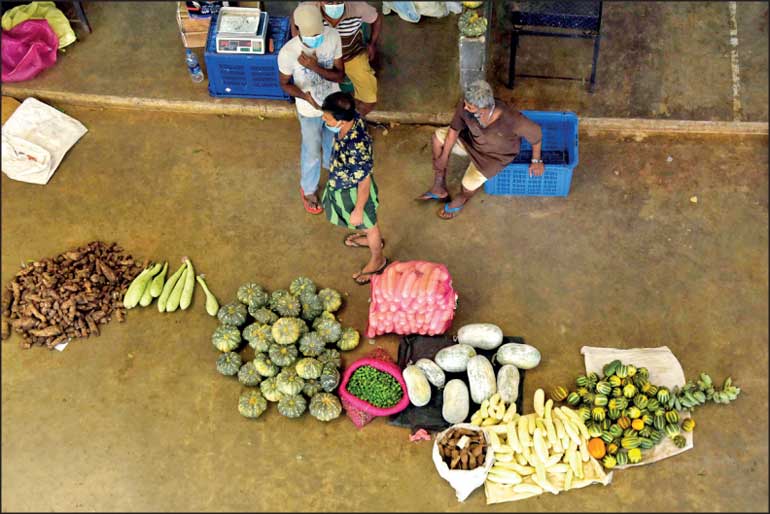Friday Feb 13, 2026
Friday Feb 13, 2026
Saturday, 16 October 2021 00:01 - - {{hitsCtrl.values.hits}}

Transforming the food system to make it sustainable, more productive, resilient, inclusive and equitable calls for an all-hands-on-deck approach – Pic by Shehan Gunasekara
 Agri-food systems are at the very foundation of human wellbeing and crucial to the achievement of the Sustainable Development Goals (SDGs). We ignore them at our own peril.
Agri-food systems are at the very foundation of human wellbeing and crucial to the achievement of the Sustainable Development Goals (SDGs). We ignore them at our own peril.
An agri-food system could be defined as everything between the journey of food from the farm to the table, and much more. A food system has interlinkages with all the other systems – like health, education and governance – which is why it is at the heart of sustainable development. Food systems exist at global, regional, national and local levels, and are very diverse and unique to their contexts and locations.
Over the years, our relationship with food has become dangerously imbalanced. We produce enough food to feed the whole world but nearly one in 10 people still don’t have sufficient food to eat, and three billion cannot afford a healthy diet. At the same time, we waste one-third of all food produced – along with the natural resources that go into its production. Transforming the food system to make it sustainable, more productive, resilient, inclusive and equitable calls for an all-hands-on-deck approach.
The State of Food Security and Nutrition in the World 2021 – FAO’s flagship report which is supported by four UN agencies including IFAD and WFP shows that 7% of Sri Lanka’s population is undernourished. Nearly one in every two women of reproductive age is obese or overweight, two out of five children between six and 12 years are underweight and a third of pregnant and breastfeeding women are anaemic.
Clearly, the road ahead is arduous and long. But we are committed. The Food and Agriculture Organization (FAO), the International Fund for Agricultural Development (IFAD), and the World Food Programme (WFP) share with the Government of Sri Lanka a vision to build a hunger-free country alongside an efficient, inclusive, resilient and sustainable agri-food system. Our goal of better production, better nutrition, better environment and a better life for all must ensure that no one is left behind.
The Government of Sri Lanka’s new agriculture policy is a major step forward. It aims to transform current food systems and calls for food production that is socially, economically and environmentally sustainable, and for farmers to be connected to local and global markets through inclusive value chains. In the context of the ever-increasing impact of climate change, Sri Lanka is committed to taking adaptation and mitigation measures and reduce food loss and waste, thus saving the country’s precious natural resources.
Ambition to reality
The term “food systems” invites us to think about a broader set of valued outcomes such as nutrition and health, livelihoods, and planetary health; to think about a broader set of factors that can influence these outcomes; and to think about synergies and trade-offs between all of these. Any attempt to transform ambition to reality would entail understanding all these in the context of people, culture and society.
There are many relatively low-cost, high-impact initiatives that can help hundreds of millions of people overcome hunger. All three of our agencies work with various stakeholders, from the national and local governments to civil society and private companies, to remove the roadblocks in ensuring everyone has regular access to sufficient amounts of affordable, safe and nutritious food.
For example, an IFAD-assisted intervention to support smallholder farmers to upgrade tea and rubber plantations through modern plantation and irrigation interventions has led to an improvement in incomes and wellbeing.
FAO’s work with Sri Lanka’s Land Use Policy Planning Department to develop a sustainable land management-based curriculum and the use of social media platforms for farmer field schools, as well as its Good Agriculture Practice certification programme with the private sector, has been path-breaking in introducing sustainable land management practices in the country.
To address the critical burden of malnutrition, WFP is working with the Government and partners to strengthen food systems and improve community development through its Home Grown School Feeding project, which leverages the national school meal programme as a vehicle to source nutritious food items from smallholder farmers for the school meals. This helps to enhance the quality standards of the meal and brings financial sustainability into the national school meal programme.
Transforming our food systems is not just the responsibility of governments, or smallholder farmers, or UN agencies. We as consumers are an active part of agri-food systems, impacting it through the food we choose and the way we prepare, cook, store and dispose of it. We can play our part by choosing nutritious and environmentally and socially responsible products – for example by adding locally grown and seasonal foods to our diets and reducing food waste. The future of food is in our hands.
We understand the urgency of facilitating transformation of the agri-food system towards better production and consumption practices. We may not have all the answers -- but we do know that business as usual will not work. Achieving transformation will require a considerable shift in mind-sets — especially regarding possible futures versus the status quo, and the roles and responsibilities of all stakeholders. We must take important, urgent steps without delay to support a carefully managed transition process.
(Vimlendra Sharan is the FAO Representative for Sri Lanka and the Maldives, Sherina Tabassum is the IFAD Country Director in Sri Lanka and Abdur Rahim Siddiqui is the World Food Programme Representative and Country Director in Sri Lanka.)